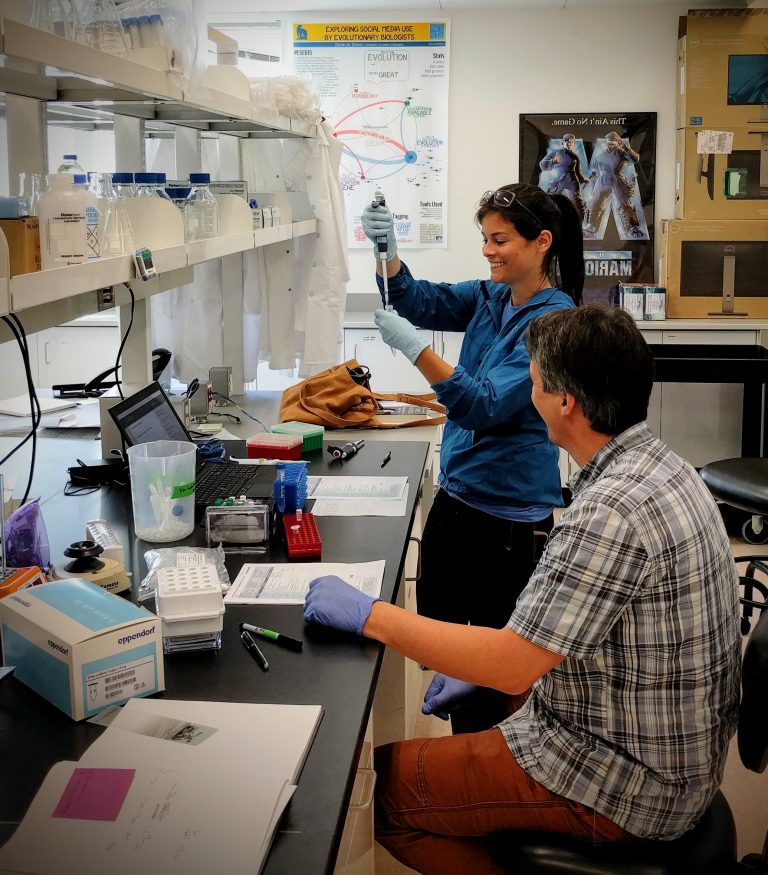I want most of all to help my students learn how to think about complex problems in biology and how to apply their analytical skills to larger issues they will face as citizens. Thus my goal in mentoring at all levels is to provide students the tools they need to apply their new knowledge to other advanced subjects.
I want my students to gain the ability to think critically and to use the scientific method to analyze problems and then to draw logical conclusions.
Through achieving this goal, I hope that my mentees develop their independence. Accomplishing this goal requires that I teach my students how to break down a problem, how to critically analyze data, and how to come up with an answer supported by evidence. When students acquire analytical skills to solve problems, they gain the ability to apply what they have learned to new problems and come up with creative solutions. This is what I strive to help my students to achieve.

Both of my parents were high school teachers and they showed me that I must take an active role helping students understand the challenge of a new subject. Success requires assessing student comprehension and revising my methods in light of what proves to be effective. I strive to be responsive to the individual needs of my mentees.
Teaching at all levels should provide not only content about the particular subject, but also opportunities to learn about the process of doing science. Providing students with the story of how data are collected or experiments are designed gives them a clearer understanding of the scientific method. Teaching students about the process of science develops their analytical toolbox so they can apply their knowledge to new areas. Perhaps the best way to learn the scientific method is to have the opportunity to do research.
During my graduate and postdoctoral career, I was responsible for mentoring several undergraduate and graduate students on research projects. For instance, I worked on a long term survey of genetic diversity with a student. Before collecting any data, we discussed the sampling design and she chose a portion to work on. We read background material of the molecular techniques and then applied them by sequencing DNA from our field collected snails. Because her research was a portion of a larger survey, she could put her research into a more complete context. At the end of the project, she was able to present her research as an honors thesis complete with a written and oral presentation.
I will emphasize building a solid mastery of knowledge. By revisiting your past accomplishments, I want to foster confidence and spirit of independence. My research space is built into an open lab environment. Here, mentees can observe researchers at all levels in the midst of doing experiments. Not only are there ample opportunities to learn new methods and techniques, but also the ability to witness the challenges of conducting research. My door is open and the coffee machine is within sight. I hope mentees drop by to talk about research. Once a week we will: 1) address the previous week’s accomplishments, 2) deal with unexpected issues, and 3) identify the set of goals for the next few weeks.
Teaching and Mentoring Education
2022 The Inclusive STEM Teaching Project
Seven-week course where participants engage in reflection and discussions around topics of equity and inclusion in learning environments across a variety of institutional contexts. This course is designed around identity, power, positionality and privilege informed by core principles with the goal to improve participants’ awareness, self-efficacy, and ability to create inclusive STEM learning environments for their students.
2020 Active LENS Train-the-trainers Workshop
Weeklong workshop providing training on the integration of the Avida-ED digital evolution learning platform into coursework. Avida-ED was developed to help students learn about evolution and the nature of science.
2019 EPIC, University of Alaska Fairbanks
Two-semester, cohort-based program that supports UAF teachers developing and delivering online courses.
2016 Research Mentor Training, National Research Mentoring Network
A synchronous online six week training workshop focused on improving mentoring relationships with undergraduates researchers. Training included a community of peers from across the country.
2015 iTeach, University of Alaska Fairbanks
A hands-on workshop offered by the Instructional Design Team at UAF eLearning & Distance Education. This workshop is tailored to help faculty improve upon everything from how to gather and manage research, to creating course schedules that work, to building and managing online learning communities, and everything in between.
2007 Preparation for College Teaching, Washington State University
Formal instruction from a diversity of departments of strategies for teaching material in different contexts including student assessment activities beyond standard tests and quizzes. Other topics included: communication skills for engaging students during a lecture as well as leadership and management skills to help combine an active research program with teaching responsibilities.